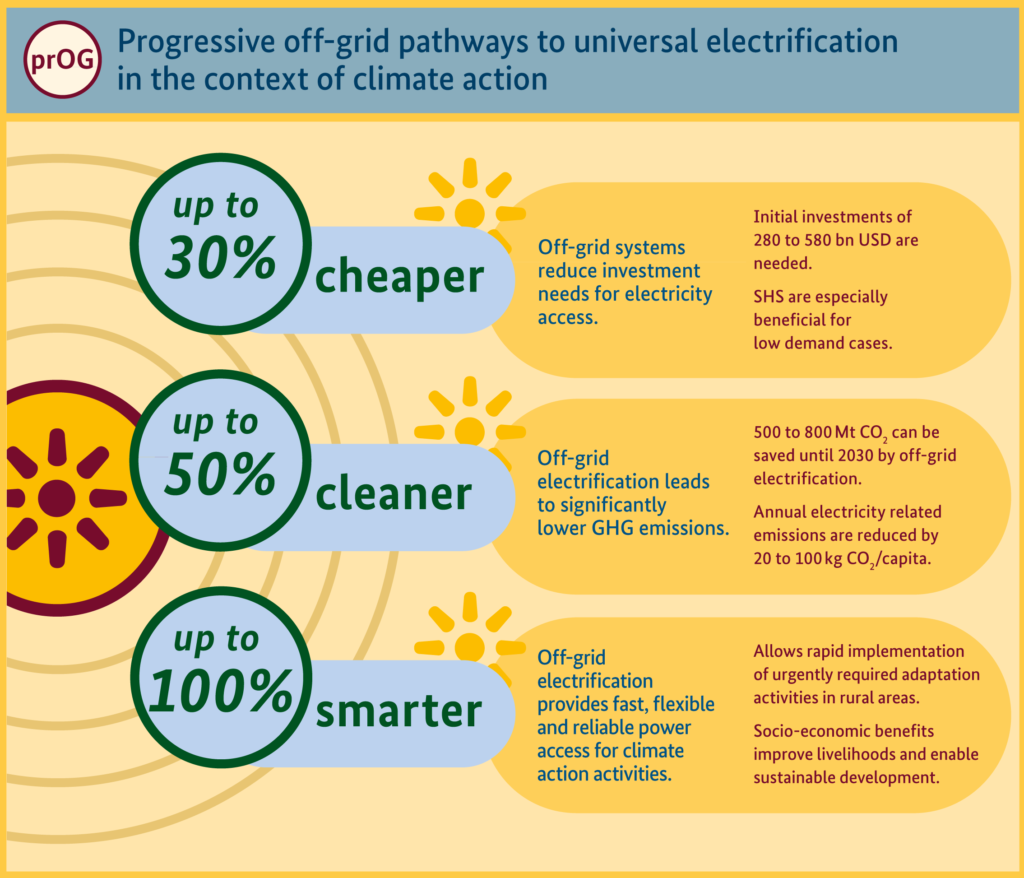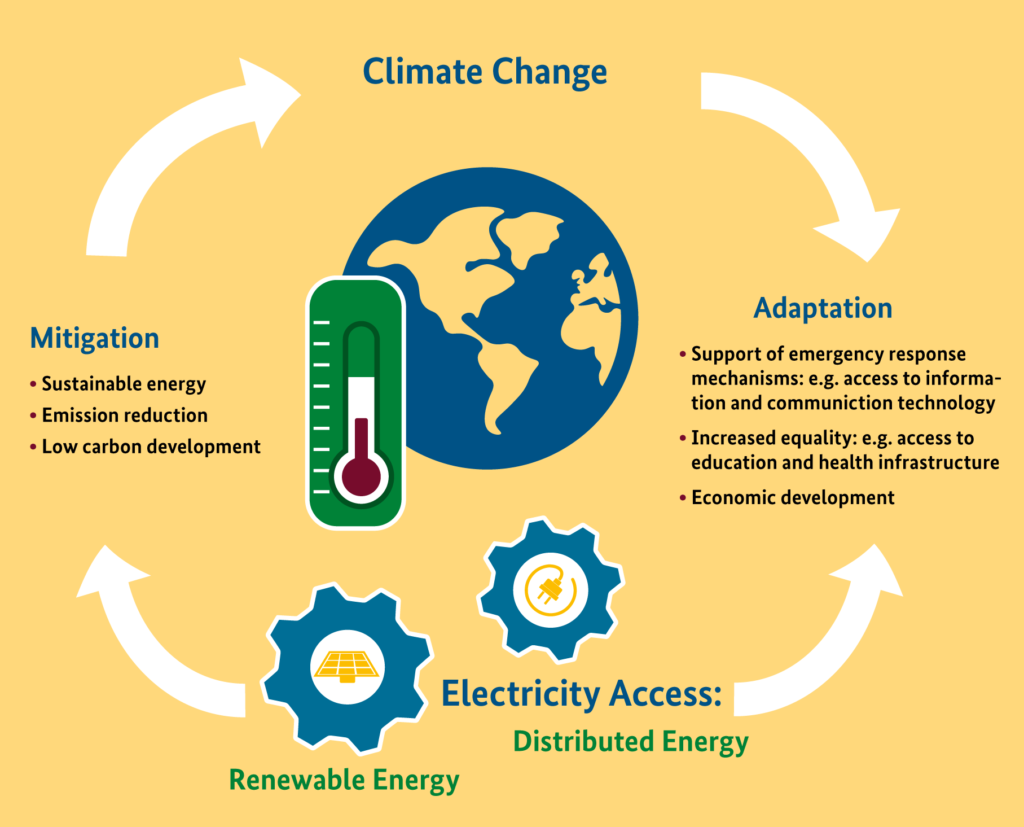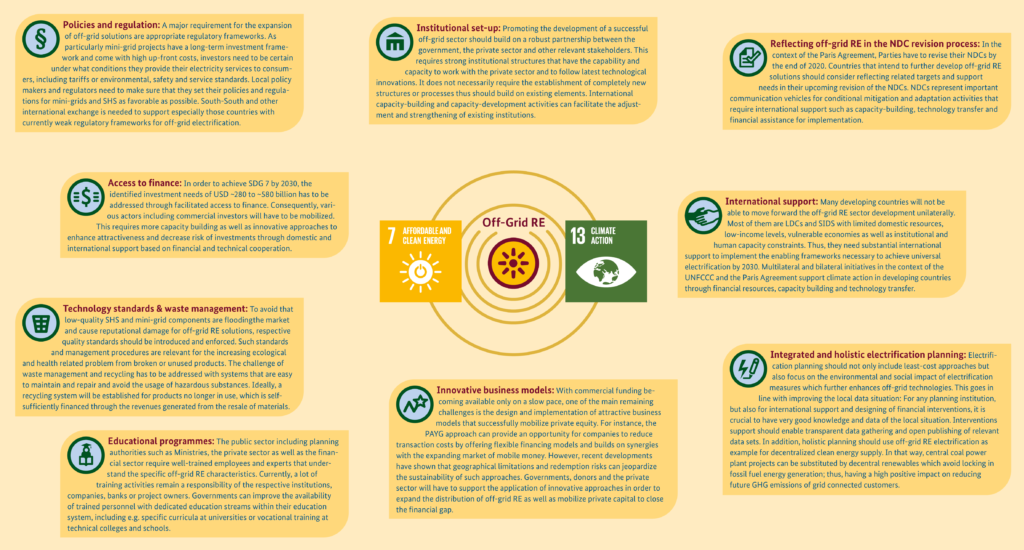
Study: Nationwide demand for charging infrastructure for e-vehicles until 2030
23. January 2020
30.01. | Colloquium Fundamentale: Future Batteries
30. January 2020Off-Grid Renewable Energy opens up pathways for Electricity Access and Climate Action

Off-grid Renewable Energy can have significant merits over grid expansion + has the potential to reduce needed investments and greenhouse gas emissions + provides pathways for green growth, improved livelihoods and sustainable development
29.01. | Achieving universal electrification by 2030 (SDG7) implies the provision of electricity access to more than 1.2 billion people cumulatively, of which the majority characterizes as highly climate vulnerable. Together with the climate advisory network the greenwerk., researchers from the Reiner Lemoine Institut (RLI) assessed in a global study Off-Grid Systems (mini-grids and solar-home-systems) regarding their importance for electrification and climate action. Particularly the impact of off-grid technologies for providing electricity access in 52 target countries with low electrification rates was quantified. Furthermore, market potential, related greenhouse gas emission mitigation and the respective socio-economic benefits were analysed.
„Electrification and climate action should be stronger linked together in the global effort to achieve the Sustainable Development Goals“, Philipp Blechinger, Head of the Research Unit Off Grid-Systems at Reiner Lemoine Institut, sums up the findings. „Off-grid Renewable Energy can play an important role in achieving SDG7 as well as contributing to SDG13 in a cheaper, cleaner and smarter way.“
Off-Grid Renewable Energy is Cheaper
We find that initial investments of approximately 400 bn USD are needed to achieve SDG7 in a Universal-Electricity-Access scenario with minimum energy supply levels for households combined with current policy frameworks (uEA scenario). Strong focus on off-grid electrification (prOG scenario) would cut investment needs by 30 percent in this low demand case and still by 5 percent in a higher demand case. Solar Home Systems (SHS) are identified as the most cost-competitive solution for household electrification expecting low to medium demand levels.
Off-Grid Renewable Energy is Cleaner
Our analysis of the greenhouse gas emissions related to new electrification reveals a strong mitigation effect through Off-Grid Renewables. This is due to the effect that highest per capita emissions occur for people with no electricity access (using kerosene lamps) or with grid connection. In contrast to this, off-grid electrification has minor (mini-grids) or zero (SHS) related emissions. Cumulated CO2 reductions for the electrification scenarios range from 211 to 283 million tons (uEA scenario) and from 488 to 872 million tons (prOG scenario) compared to a Business as Usual scenario for the period 2017–2030.
Off-Grid Renewable Energy can vastly improve local livelihoods
Comparing off-grid solutions with grid electrification reveals that grid extension often fails to bring reliable energy access, as it provides high capacities but only little energy in the case of weak grids. In contrast to this, off-grid electrification is often the smarter solution, providing flexible and reliable electricity for the fast implementation of various activities to improve livelihoods in rural areas. Off-grid renewables provide not only resilience towards adverse consequences of climate change on human and environmental systems, but also sustainable development tailored to the local needs.
Policy Interventions are Needed
National and international institutions as well as the private sector need to work together to urgently implement the recommended mini-grids and SHS for the benefit of the un-electrified populations. We suggest to focus on nine fields of intervention, which are derived from the detailed analyses of key barriers and solutions for off-grid electrification and from the country deep dives. These include much needed access to finance as well as a need for local policy makers and regulators to make sure that they set their policies and regulations for mini-grids and solar home systems as favorable as possible. Integrated and holistic electrification planning is needed as well as educational programs to ensure the availability of well-trained employees and experts that understand the specific characteristics Off-Grid Renewable Energy.
Full Report and Interactive Scenarios
For detailed information, feel free to check out the full report “Off-Grid Renewable Energy for Climate Action” (Executive Summary and Main Findings on pages 7-9, recommendations on pages 60-61) as well as the interactive scenarios showing investment needs and the mitigation potential of different technology options in different scenarios as well as for different energy access levels via the Renewable Energy Off-Grid Explorer.
Off-Grid Renewable Energy solutions for sustainable energy access for all (SDG7) as well as combating climate change and its impacts (SDG13) is a focus of the research that was funded by the German Federal Ministry of the Environment, Nature Conservation and Nuclear Safety (BMU) and coordinated by the Deutsche Gesellschaft für Internationale Zusammenarbeit (GIZ).







